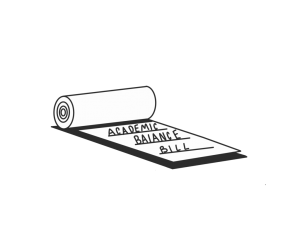Though Imperfect, The Bill is a Good Starting Point
May 5, 2018
Minnesota legislators continue to debate the contentious bill SF 2487 that, if passed, will require public school districts to develop and implement policies that require academic balance in all educator teaching methods. Conversation about the bill has focused on Edina Public Schools and allegations from conservative EPS students accusing the district of liberal indoctrination and discrimination against conservative students. This topic gained widespread community awareness this past fall when the right-wing Center of the American Experiment publication mailed a magazine to all Edina residents that featured an article condemning the district’s focus on equity.
The bill’s opponents argue that it is completely unnecessary and that educators are already prohibited from displaying discrimination in the classroom and must establish an atmosphere that is conducive to learning by the Code of Ethics for Minnesota Teachers. However, this policy is clearly not being implemented properly, and lacks a strong foundation for teacher regulation when it comes to controversial issues in the classroom.
Some that the language of the bill is extremely vague, which would give school board members too much power to judge what is appropriate to teach in the classroom. Some opponents of the bill, like Dave Edwards, father of a transgender girl attending a St. Paul charter schools, claim that through this bill teachers will not be able to respond with ‘factual information.’ However, the language in the bill specifically says starting on line 2.19, “The policy [of this bill] does not apply when an employee disseminates factual information consistent with the employee’s contractual duties.” If the teacher is not educated on certain topics that pertain to gender identity for example, then how are they supposed to be able to respond with factual information when all that they really have is their own opinion to share with the students? Therefore, the bill’s proposal in making sure that the teacher has special competence or training in the controversial political topic up for discussion is a logical way of making sure that teachers are teaching students how to talk about controversy without imposing their personal viewpoint.
Another argument against the bill is that it will obstruct educators’ first amendment rights in schools. This seems like a silly argument because in reality, does anyone really have complete freedom of speech in school? Past Supreme Court rulings (see discussions about Hazelwood School District v. Kuhlmeier and Bethel School District v. Fraser) have made it clear that the right to free speech and expression is subservient to achieving legitimate educational goals. Therefore, a school cannot be comparable to a public setting where anyone can stand on a soapbox or post a notice on a bulletin board at any time one pleases. While students and teachers technically do not “shed their constitutional rights to freedom of speech and expression at the schoolhouse gate” (Tinker v. Des Moines), both speech and expression are not quite as free inside educational institutions. Therefore, this bill will not be taking away any of the teachers’ rights in a school setting, but will be legally implementing a policy that has been continuously broken by teachers, allowing students to take a stand against their teachers that are creating a partisan environment.
Schools ought to be political places, but not partisan ones. Public schools are supposed to embody a key goal of the First Amendment by creating informed citizens that will one day be capable of self-governance and political debate. According to the Supreme Court in Keyishian v. Board of Education, the classroom is the marketplace of ideas, and the future of the U.S. depends upon leaders trained through exposure to diverse ideas in order to uncover the truth for themselves. Teachers should be leading their classrooms in a discussion between students with different perspectives, not using their authority to tell students what to think or what is right and wrong.
It is uncertain that the SF 2487 bill is the solution to this complex predicament. It is not as simple as banning pupils, teachers, administrators, and other school personnel from engaging in controversial political debates in the classroom, the same way that gun control is not as simple as taking away the second amendment and banning all guns from public possession. There most certainly is not going to be one overarching policy that is going to apply to every single case of political discrimination in the classroom, but the introduction of this bill is the first step in addressing the problem. Teachers should never get away with bullying other students because of their political affiliation, making them feel like outcasts in what should be a safe place. The problem lies within a lack of action from district officials in addressing the taboo topic of politics in schools, and SF 2487 has done its job in bringing this issue to light.




Maddy Lawler • May 5, 2018 at 9:03 pm
In today’s world, even facts have become partisan. How can we differentiate the limitation of “controversial topics” from the misinformation of our youth, re: Scopes Monkey Trial? Your personal opinion that the moon is made out of cheese doesn’t change the fact that it isn’t.